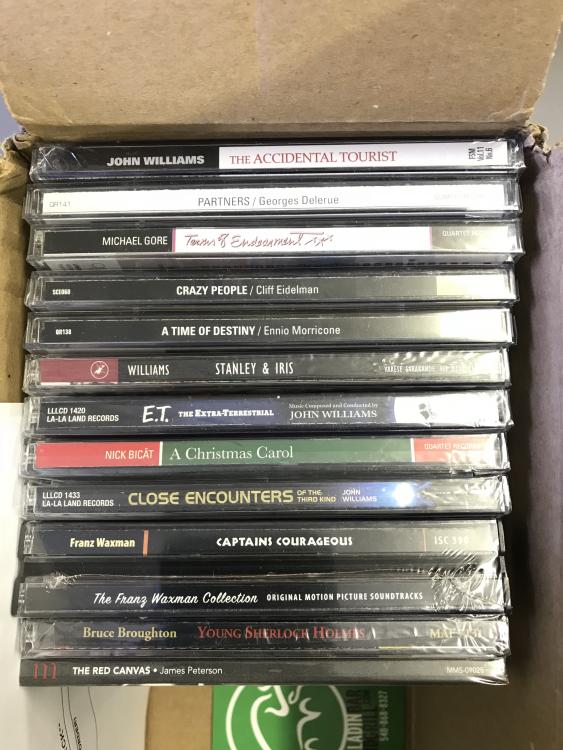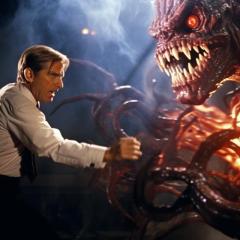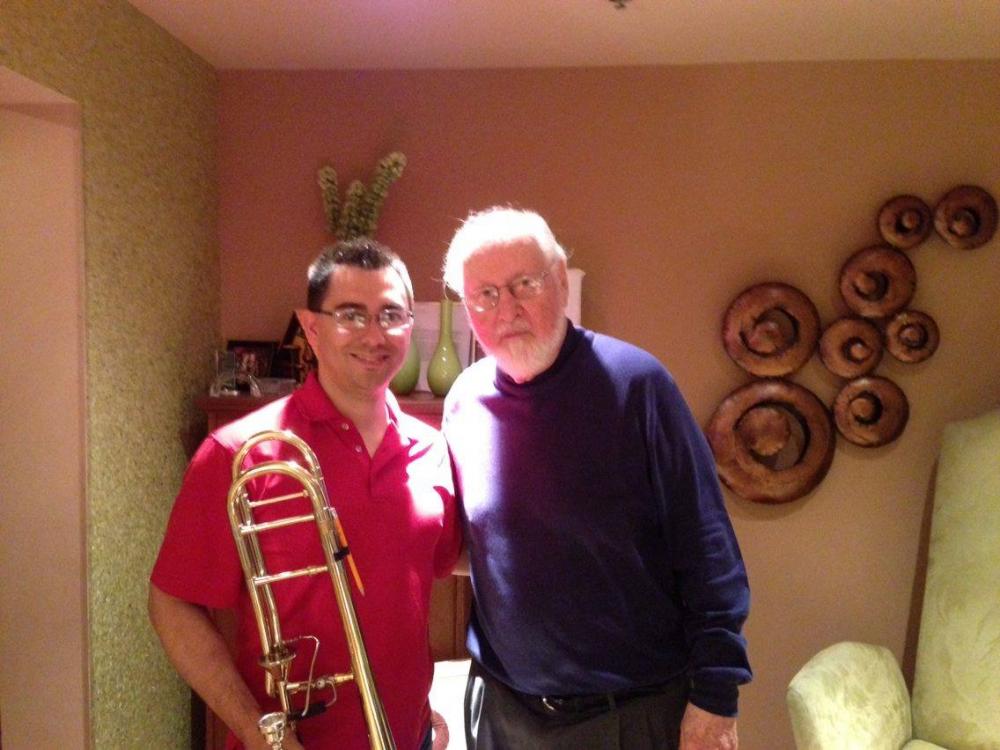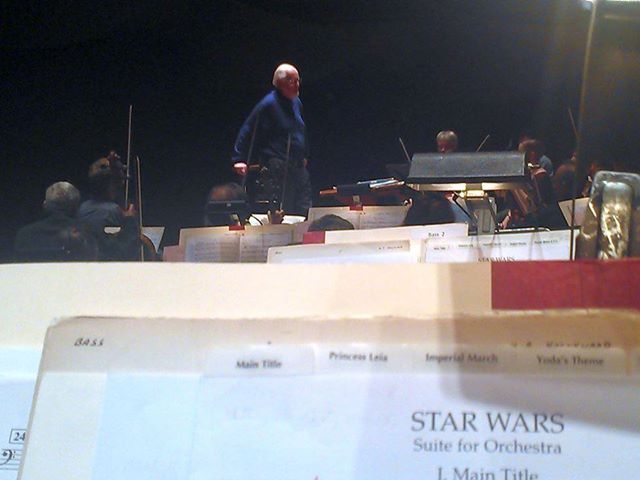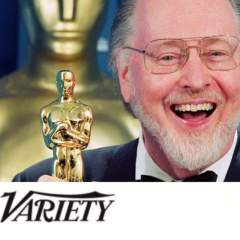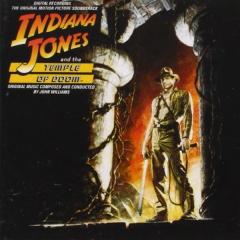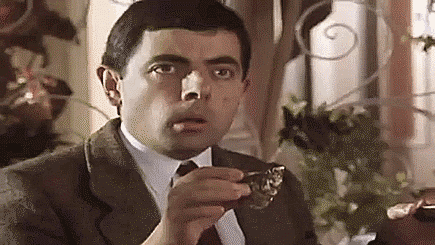Leaderboard
Popular Content
Showing content with the highest reputation on 18/03/18 in all areas
-
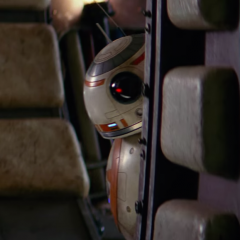
THE LAST JEDI - Score as heard in the movie thread - SPOILERS ALLOWED
crumbs and 3 others reacted to DominicCobb for a topic
Sometimes I wish the moderating here was a bit more strict. I don't come here to read about people's opinions on the movie, if I did I'd visit that thread. If I'm in a thread for the score, I want to read about the score, not the same tired and ridiculous complaints I've heard for the past few months.4 points -
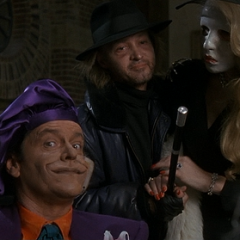
Alan Silvestri's READY PLAYER ONE (2018)
Simon McBride and 2 others reacted to Gruesome Son of a Bitch for a topic
V'ger.3 points -
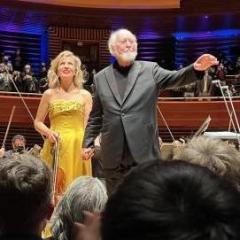
THE LAST JEDI - Score as heard in the movie thread - SPOILERS ALLOWED
DarthDementous and 2 others reacted to Taikomochi for a topic
If there is one thing this forum sure needs, it’s more people bashing The Last Jedi, especially when they are criticizing the film in all the score discussion threads!3 points -
Please meet Baltimore Symphony Orchestra bass trombonist and lifelong John Williams fan, Randy Campora. I had the honor of performing next to Randy a week after John Williams conducted this orchestra in an all Williams concert. I enjoyed hearing Randy joyfully gush about Williams' amazing music and talent but also what a joy it was to perform under him. I wanted to interview Randy and ask him more about his musical experiences, his experiences working in a major symphony orchestra, and the impact of John Williams’ music throughout his life. KE: How and when did you first come to love your instrument and what was it about the trombone that you first connected with? RC: In third grade, we were told that the band teacher was going to ask us what instrument we wanted to play, and if we're interested we should be thinking about that. I saw on TV that the trombones were always in the front line, and when they demonstrated the trombone at school I wondered how they got that metal slide to go down their throat without injury - I had to find out how it worked! Also, as a toddler, I wandered off at the zoo one day and my mom found me hiding in the corner of the gazebo listening to a band rehearse, with my eyes glazed over in amazement. KE: What qualities do you look for when evaluating an instrument? For example, do you look for a big bold tone, something that’s solid, slots easily, gives you flexibility in tone color, free blowing, etc. RC: I look for an openness of tone that can also be controlled in all registers and dynamics, a good relationship between inner focus and outer radiance (bloom), ability to project with warmth and color, clarity of articulation, ability to meld into the other players but also step forward towards the audience when needed. It also must ergonomically fit my body comfortably. I use an Edwards dependent axial valve section, a 1575cf bell (22 gauge yellow brass, soldered rim, heat treated, cf treated, 10” diameter), a yellow brass single radius tuning slide, a 502-V single bore slide (rose tubes, yellow crook, #2 brass pipe), and a Griego .5 NY mouthpiece. I also have the rose brass version of the bell, a 1574cf, which I can use for earlier composers—it gives a more classic German profile. I recently switched to the single bore slide from the dual bore after many years. The new 502 design seems to give me the best qualities of both, but with easier control, more color and easier projection. The dual bore skews more towards the contrabass profile, which is great for many things, but not good for all things. In the past I used Bachs for many years, with Schilke 60 mouthpieces of various rim sizes, backbores, and shanks; Minick L or OL pipes from Los Angeles; Thayer valves, mostly dependent setups, but for a while an in-line (in-line Thayers don’t fit my neck/jaw very well and mess up my ability to get the mouthpiece in the right spot on my face). KE: Who was most influential in your performance technique and why? RC: The players and teachers I first heard on bass trombone, in this order: LA/NYC TV and recording artists, on Lawrence welk and on my dad’s stereo in the car; George Roberts; David Rollins, my first bass trombone teacher; Thad Jones Mel Lewis Band; Stan Kenton Band; Florida State students Brian Brink and Jeff Thomas; Jeff Reynolds on his LP; Thomas Streeter on his LP; William F. Cramer, my professor at Florida State; Charlie Vernon; Douglas Yeo (my teacher at Peabody); John Engelkes; My colleagues David Fedderly, Eric Carlson, James Olin and Chris Dudley. KE: How did you come to decide to be a professional musician? RC: In middle school, I decided it would be smart to figure out what I was going to do with my professional life so I could get a jump on things and not waste time and effort. I went to the library section on professions. I checked out all the books on things that seemed interesting to me. There was one book about being a professional musician. I decided this was the best fit. From then on I kept an open mind but had this as my goal. a. What has the experience of being a professional musician been like? Wow, I hardly know where to begin! More multi-layered than I thought it would be, more people centered than I expected—more influenced by the human organizational behavior aspect than I imagined. I have no complaints overall, in a big picture sort of way, though there are things I would change if I had Harry Potter’s wand. b. What did you wish you knew then that you know now? I would be more patient and understanding with certain colleagues that I thought at the time were not contributing as much as I thought they should. I would be less critical and more supportive, even when their decisions didn’t make sense to me. KE: What would you say was your first big break? RC: There were “two” first big breaks: when I was allowed to join the FSU top Jazz Ensemble at the age of 16, and when Douglas Yeo felt I was ready to sub for him in the BSO on a program of Beethoven’s Missa Solemnis with David Zinman. KE: What was the audition experience like to land your current job with the Baltimore Symphony Orchestra? RC: I was super nervous leading up to it—it was my first audition—so much so that I almost decided to not do it because I didn’t want to start auditioning before I was ready to withstand the pressure. But once on stage, I was fine and I felt I could just do my thing. The feeling of winning and being offered the job is something you never forget. I felt like the whole city was mine for a day. KE: What unsung work do you consider one as a favorite to perform but might not be as popular by audiences? RC: Pieces by Nielsen (Sinfonia Espansiva), Vaughn Williams (4th Symphony), Sibelius’s tone poems besides Finlandia, Janacek, Martinu’s ballets, Dvorak’s later tone poems, Scriabin’s symphonies. There are also pieces that audiences like but managers/conductors don’t program, like Swan Lake or Sleeping Beauty, Borodin’s Second. KE: I was very intrigued by a video posted by the Swedish trombone virtuoso, conductor, and composer Christian Lindberg where he basically did a video blog about his very unique daily routine of maintaining his performance proficiency, exercise, health, stamina, score study, and composition. What is your daily practice/performance routine? RC: I get to each rehearsal and concert about 75 minutes before so I can always do my warm up but also a session of fundamentals, including breathing and buzzing. This is in addition to the practicing I do at home. This maintenance I have found to be essential in not just keeping things in form, but self-correcting when problems arise, and moving certain playing aspects forward over time. It also keeps my mind engaged in progress and helps me as a teacher. You have to be creative in finding a space to practice at work before concerts: I use the HVAC/Sump Pump/Laundry Room, so it’s just me, the occasional custodial staff member, and the cockroaches in a hot, noisy, dusty environment, but it works. At home, I have my trombone cave, and I often listen to singers, organists, pianists, jazz or orchestral pieces while I am practicing or doing fundamentals—it’s weird but it works for me to help me absorb the greatness of others. For exercise, I used to swim, but now I walk and do weight machines at the gym. Douglas Yeo taught me the importance of score study, so I began my collection of scores early on, and I use Peabody’s music library when needed. I spend just as much, if not more, time studying the score in preparation for a program than I do on the horn. I bring the score to rehearsals for all of us to use—we don’t have to ask the conductor silly questions, we can correct our own parts, and we look erudite back there with a score instead of our cell phones! I would emphasize this heavily to younger players: the score gives you the same information the conductor has, and it evens the playing field. This is probably the most underappreciated part of orchestral playing. KE: What is a work in the common literature that you find fiendishly difficult/unnerving and what it is about that work that makes it this way? RC: The hardest piece technically I think might be Vaughn Williams’ 4th Symphony, a lot of fast passages. Elgar’s Falstaff is tough—very jagged. John Adams’ Harmonielehre and Short Ride are super challenging but are pure modern masterpieces so they are worth the trouble. When I was younger and playing Star Wars for the first time I had to really work on my multiple tonguing. The most challenging composer for me of all is Richard Strauss—his writing for bass trombone is so demanding sonically, technically, dynamically and musically. And Brahms looks so simple on the page, but it demands total perfection so you feel like a failure if you goof up an attack, get the wrong sound on a note or a chord is not in tune. There are many modern composers who simply don’t write well for brass, so in those cases, you just do your best and don’t lose sleep over it. KE: As a professional performer, there are some works that get played frequently. I’m curious how you keep the music fresh and not get bored? RC: If the conductor is good and has a point of view, boredom is not an issue. This is key. It is hard to force your own point of view on a piece if the conductor lacks one because you are one of 90 players and you can only exert so much personality and then it’s a problem. I hate when critics refer to pieces like Pictures or Scheherazade as “war horses.” Excuse me, they are masterpieces and that is why we like playing them and people like hearing them. The key is inspired partnering with conductor and orchestra. If that does not happen, you have to study your score and look for little things you haven’t noticed before and try new things and enjoy yourself. It’s good to remember that the audience is going to enjoy a piece even if the conductor is not good. KE: Are there pieces you’d like to play but haven’t had a chance to yet? RC: Strauss operas Elektra, Salome, Die Frau, and his Sinfonia Domestica; Janacek’s Sinfonietta; Wozzeck and Lulu; Sibelius’ tone poems; Nielsen’s early symphonies and poems; Gurrelieder. My least favorite composer is probably Bernstein, so it’s funny that I have played every note he’s ever written for orchestra, and recorded much of it, and played it on tour . . . KE: When did you first become a fan of John Williams? RC: I was finishing my Freshman year of high school when Star Wars debuted in the theaters. I went to see it with the whole family and loved it, and I enjoyed the music so much. Of course like all band kids you have an ear for anything orchestral even though it may be far in the background of any TV show, movie or radio show. I loved the music for each movie when it came out. But at that time we did not have band arrangements of it, and it would be a while before the Boston Pops would play his music on TV. So I did not encounter it much besides in the movies. When I first got into the BSO, we played it a lot on pops concerts both in the hall and outside during the summer. It was a thrill to finally play it, and try to sound like the soundtracks of the LSO and the LA monsters. But it was hard!! There was a lot of multiple tonguing, high range passages for the bass trombone, and at the time we only had the handwritten parts to use and they were very hard to read (it was easy to fall in a hole in the background rhythms of Star Wars or Superman, for example). With time, of course, the Williams scores, non-Star Wars, just kept on coming and it began to be obvious that we were seeing a timeless genius of our time at work. Such depth and immediate humanity, linked with knowledge of the orchestra. And of course a true melodic gift, which is so rare. KE: How did the music of Star Wars impact you? RC: It just keeps gaining ground in my musical mind over time. For example, I loved the scores to the newer movies and always buy the soundtracks on CD. I recently bought a remastered two CD complete soundtrack of The Empire Strikes Back, and to hear Denis Wick, John Fletcher, Frank Mathison and the LSO brass up close on the mics on that music is so inspiring. It warms my heart that the younger players of today are taking to the music so much. KE: What story can you tell us about your interaction with John Williams? RC: The first time we got to play with him at the BSO was just a few years ago, and it was everything I hoped for. The first thing you notice is just how warm, gracious and generous he is (this was for a pension benefit concert). He took much time signing autographs, taking pictures and talking, and this was just with the players after rehearsals! His big heart comes to you very naturally. Then, musically what I felt was that finally, someone gets all the tempos and transitions right! As a player, you do this music with so many conductors, and not all of them are prepared, so the tempo relationships are off and Williams’ transitions are harder than they look on paper—conductors don’t usually go back and listen to the movie and how things work in context. It was a magical night I will never forget, and the house was packed to the gills. He is coming to conduct us again this June, and my plan is to ask him to sign my trombone bell. It’s my favorite one and I’ll never sell it, and it might wear off, but it will always be there to remind me of one of the all-time best composers for brass. That’s if he is ok with signing it. So we’ll see. KE: What advice do you have for someone wanting to follow in your path? RC: Work hard, make sure you love it, persevere, get better a little every week, be patient, be observant as to what other things interest you in life and pursue them also, be kind to everyone of your colleagues, learn from the best and emulate their artistry and professional behavior, and have faith in your future, pour the foundation correctly. We can contribute beautiful, usable things to this world, things that are valuable to our fellow man, and this can be connected to all good things in our society that ennoble and edify the great human family over time. Special thanks to Baltimore Symphony Orchestra’s bass trombonist, Randy Campora for his time and sharing his story. Photo taken by Randy of first trombonist Joseph Rodriguez with The Maestro during a break. The orchestras view during the rehearsal.2 points
-
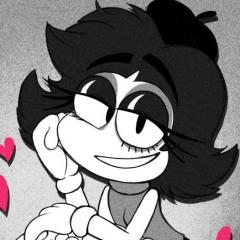
Alan Silvestri's READY PLAYER ONE (2018)
Jurassic Shark and one other reacted to Kasey Kockroach for a topic
Shorter albums are easier to fit into my CD player! The tall ones get stuck.2 points -

Off the top of your head, which are your Top 10 Star Wars themes/concert pieces?
Josh500 and one other reacted to The Illustrious Jerry for a topic
I'm going to make like Star Wars soundtracks and release an extended edition right after my first condensed release. So on top of... I have... The Rebellion is Reborn Holdo's Resolve Theme Parade of the Ewoks Landos Palace The Emperors Theme Theme from Qui Gons and Padmes Funerals The Great Jedi Purge Music Jawa Theme Cantina Band Ahch To Theme (The Jedi Steps) Han Solo and the Princess Princess Leia's Thëmë2 points -
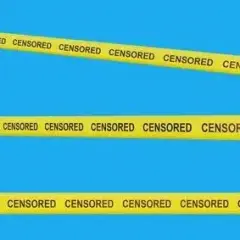
The Official Intrada Thread
Kasey Kockroach and one other reacted to Jurassic Shark for a topic
Agreed! Let's make a petition to change his name.2 points -

Alan Silvestri's READY PLAYER ONE (2018)
Pieter Boelen and one other reacted to Kasey Kockroach for a topic
It's pronounced "ee-vil". (The latter, to actually answer your question)2 points -

The Official Intrada Thread
Pieter Boelen and one other reacted to Jurassic Shark for a topic
The Daddy.2 points -
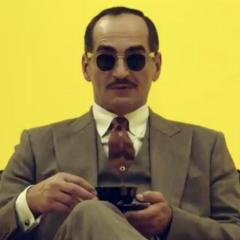
Fantastic Beasts And Where To Find Them 5-film series
Pieter Boelen and one other reacted to Arpy for a topic
Harry snapping the Elder Wand was disappointing. Deathly Hallows established the importance of wands and the connection between their owners. In the books Harry repairs his own wand with the Elder Wand (the only wand that could do so) and then agrees with Dumbeldore's portrait that its power should die with Dumbledore and to replace it in his tomb. Nope, the film is too long already, gotta snap it to wrap up the story right now.2 points -

Star Wars Prequel VS. Sequel scores
Smeltington and one other reacted to artguy360 for a topic
Without ranking specific scores and without IX yet, the prequels are better scores but the sequels are far better films. TPM is a very special score. It has a richness, a complexity, a delicate touch, and a bombastic energy that no Star Wars score has matched since. AOTC is a far lesser score but with a killer new theme. I find TLJ lacking from this particular perspective. TFA is a lot of fun and I love all the new themes and how deftly JW mixes them into the existing SW musical landscape. I think IX will decide how I feel about the sequel trilogy as a whole. ROTS is a score with some really rich passages but the new main theme is event specific and a lot of the music sounds like first pass stuff without the refinement I hear in TPM.2 points -
Here is some more music ripped from the Deleted Scenes:2 points
-
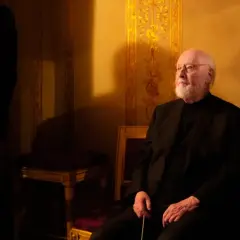
Star Wars Prequel VS. Sequel scores
Mitth'raw'nuorodo and one other reacted to Tom for a topic
IX will swing the balance in the final analysis. TPM is better than TFA, but TLJ is better than ATOC. In terms of movies, the prequels are interesting stories poorly executed, while the sequels are boring stories well executed in VII and blandly executed in VIII.2 points -
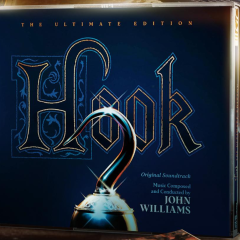
THE LAST JEDI - Score as heard in the movie thread - SPOILERS ALLOWED
DominicCobb and one other reacted to Jay for a topic
Yes, take the film discussion to General Discussion please, and talk about the score here. Thanks.2 points -

Alan Silvestri's READY PLAYER ONE (2018)
mstrox and one other reacted to The Illustrious Jerry for a topic
42 minutes and around 30 seconds will suffice for me.2 points -
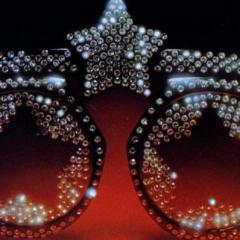
THE LAST JEDI - Score as heard in the movie thread - SPOILERS ALLOWED
DarthDementous and one other reacted to Nick Parker for a topic
It's been talked about so much, is it really that interesting? Have you found any points raised that breathe new life into it?2 points -

THE LAST JEDI - Score as heard in the movie thread - SPOILERS ALLOWED
DarthDementous and one other reacted to John for a topic
You can stop watching the movie if you're just going to give us a running commentary of all your gripes with it.2 points -
1 point
-
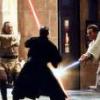
Off the top of your head, which are your Top 10 Star Wars themes/concert pieces?
Josh500 reacted to SF1_freeze for a topic
1. The Force Theme 2. Main Theme / Lukes Theme 3. Imperial March 4. Luke and Leia 5. Duel of the Fates 6. The Emperors Theme 7. Reys Theme 8. Han and the Princess 9. Across the Stars 10. Shmis Theme1 point -
Impossible list, I'd have to go through every piece of music I've ever listened to to properly rank them (I can forget so many things I love!) and it'd probably change weekly anyway. A Day in the Life would probably be a given. Probably Rock n Roll Suicide, too. Can't forget Time! If Bespin can post gibberish, here's some more: It's not a masterpiece musically, nor does it require much singing talent, but the incredibly relatable bittersweetness of the melody and the lyrics makes it still one of the most popular songs if the country. It's about a summer vacation at Lake Balaton (national and cultural icon, largest lake of Middle-Europe, every Hungarian goes there at least once every year, it's just a given) that's about to end, reflecting on some of the silly small things that happened that stay with us. I have a ton of songs I know in and out and always love to nod/hum along to, but to actually make it to the top 5 favourite requires a bit more, and I'll probably stop here now or I'll fall into another endless loop of clicking on another song I love in the Youtube Recommended feed and realising it's 1 o'clock and I have to get up at 6.1 point
-
I actually appreciate how dense they are, thematically, and how full of unusual colors they are. Anything from bagpipes through a Gamelan orchestra to didgeridoos. Both aspects, which are very much at the heart of these scores, are more pronounced in The Hobbit than in The Lord of the Rings. Their flaw from a dramatic standpoint is the complete ommision of the company's thematic material. I understand that doing away with those very bold themes accentuates the more foreboding tone of the later two entries, but they should have at least made a cameo in one, if not both, of the later scores.1 point
-
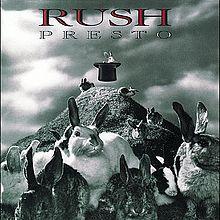
Star Wars Prequel VS. Sequel scores
John reacted to Naïve Old Fart for a topic
Not wanting to split hairs, but...I prefer to wait until compete scores of Episodes I-III, and Episodes VII-IX are available, until I make any final decision. Right now, however, I'd say that, although Episode I is my current favourite, Episodes VII and VIII seem to be, stylistically speaking, closer to to the original trilogy, than Episodes I-III.1 point -
1. - Luke's Theme 2. - Princess Leia's Theme 3. - Imperial March 4. - Rey's Theme 5. - Rebel Fanfare (If one major appearance, it's either TIE Fighter Attack or The Death Star) 6. - The Rebellion is Reborn 7. - The Asteroid Chase 8. - I hate the concert arrangement of March of the Resistance, but the way the theme itself is handled in TFA and TLJ puts it up here. 9. - Parade of the Ewoks 10. - Jabba the Hutt I'm also really growing to love Rose's Theme.1 point
-

What are your Top 5 all-time favourite songs?
Bespin reacted to The Illustrious Jerry for a topic
How can this be.... Let me think for a bit because this is life altering.1 point -
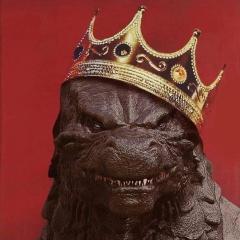
Alan Silvestri's READY PLAYER ONE (2018)
Pieter Boelen reacted to Unlucky Bastard for a topic
I love the original alternate to the end battle too. Feels more, I dunno, 'organic' than the revised version.1 point -
The CRs are decidedly not the film mix. Just look at the prominence of voices in the mix of the film (which is to say nothing of the OST!) compared to the CR. There are times in the Fellowship of the Ring CR where the choir is drowned in the orchestra. Its also true of The Hobbit: The film mix of The Battle of the Five Armies is not nearly as bass-y as the album, fortunately enough.1 point
-
1 point
-

What Is The Last Score You Listened To? (older scores)
Naïve Old Fart reacted to Unlucky Bastard for a topic
Because I really can't be bothered installing ceiling speakers. I already sort of knew it'd all end at 7.1 for me, and even that's still a novelty. I still laugh at people on that Facebook 4K group who unironically cry "What? No Atmos?! I'm returning this disc!"1 point -

The Official Intrada Thread
Jurassic Shark reacted to bollemanneke for a topic
I pay CDs and shipping costs. Only Varèse prints the value on the package which makes the kindergartners charge me extra fees because it doesn't come from the sacred, almighty EU.1 point -

Alan Silvestri's READY PLAYER ONE (2018)
Not Mr. Big reacted to Jurassic Shark for a topic
ID4 is too long in the complete release... haven't heard the extended Godzilla.1 point -

John Williams Discography
Jurassic Shark reacted to Bespin for a topic
Children, do not roast you vinyls, it's not a good idea! NEW LP releases added to the website: (Reissued in 2018 as 2-LP, Walt Disney Records, 50087384715) Main Title / Escape; Ahch-To Island; Revisiting Snoke; The Supremacy; Fun With Finn And Rose; Old Friends; The Rebellion Is Reborn; Lesson One; Canto Bight; Who Are You?; The Fathiers; The Cave; The Sacred Jedi Texts; A New Alliance; "Chrome Dome"; The Battle Of Crait; The Spark; The Last Jedi; Peace and Purpose; Finale. (Reissued in 2018 as 2-LP, Music On Vinyl, MOVATM190) The Papers; The Presses Roll; Nixon's Order; The Oak Room, 1971; Setting the Type; Mother and Daughter; Scanning the Papers; Two Martini Lunch; Deciding to Publish; The Court's Decision and End Credit. Geez, they even did it with Charles Aznavour. I'm finished!1 point -

Star Wars Prequel VS. Sequel scores
bollemanneke reacted to Unlucky Bastard for a topic
I love the thequel thcoreth. The theme for Rey ith played at every feminitht gathering at my camputh.1 point -

John Williams Discography
Naïve Old Fart reacted to Bespin for a topic
Fixed! A porg-shaped vinyl... really??? http://recordstoreday.com/SpecialRelease/102301 point -

THE LAST JEDI - Score as heard in the movie thread - SPOILERS ALLOWED
John reacted to Manakin Skywalker for a topic
^It's magnificent. With chocolate milkshake as well.1 point -
TPM & ROTS > TFA & TLJ > AOTC (I voted Prequel scores)1 point
-

THE LAST JEDI - Score as heard in the movie thread - SPOILERS ALLOWED
DarthDementous reacted to John for a topic
Ever try dipping French fries in a vanilla milkshake? You'd expect the flavors and consistencies of the two foods to completely clash, but it's actually pretty good.1 point -

Far and Away being released on Blu-Ray on March 4
bollemanneke reacted to Pieter Boelen for a topic
I do believe it is. Fairly good version of it too.1 point -
Ugh. Anyway, back on topic, rewatched TLJ tonight (in normal form) and again loved that soundtrack. The film carries music incredibly well, considering all but 10 minutes of the film are scored. The only time I felt music was unnecessary was during the Kylo/Luke sequence, as the First Order fires all their weapons at Luke. Half the music is tracked from Escape anyway, so eh! Either way, just reiterates how skewed the impression of the score is on OST. I reckon a solid 2 hours of the film is original score and the remaining 20 is existing themes, but I'll have to measure it out just to reassure myself. In any case, the film is definitely not just "TFA regurgitated" or any nonsense like that. And just when you think you've seen the best scored and orchestrated music of any film in 2017 (the sacrifice sequence in Escape), JW tops it (with Holdo's Resolve) then JW tops it again (with The Spark). He's a genius.1 point
-

Fantastic Beasts And Where To Find Them 5-film series
Arpy reacted to Smaug The Iron for a topic
Just to be clear, Neville’s parents are not dead. Bellatrix, her husband, her brother in low and Barty Crouch Jr tortured Frank and Alice Longbottom for information. This made them mentally damage for life. They now live in St Mungo's Hosptial for Magical Maladies and Injuries.1 point -

THE LAST JEDI - Deleted scenes feature original score by Williams
DarthDementous reacted to Holko for a topic
5.1 deleted score rips! All done, some may need the previous score tracks overlapping in the beginning or end - That's why I uploaded the complete Fathiers track, too, that one's a bit more complex. Some more sound effects could have been removed or dialed down, but at the cost of more time I don't have at the moment, and probably worse quality and more jumping from left to right or from stereo to quasi-mono. I know Youtube is too lossy for some, so I have the original FLAC files if you PM nicely. The complete Fathiers is glorious (well, will be when it gets a proper release) - we're really going around in circles but Johnny must have found the Fountain of Youth.1 point -
.jpg.c8fef82d737fbab8398f565314a5a6c3.thumb.jpg.743032dddf9cee382c2d7c0555496c2e.jpg)
Alan Silvestri's READY PLAYER ONE (2018)
Bilbo reacted to MedigoScan for a topic
See I am never going to abandon my stance of 'more is better' Because I have never seen a short album that had everything I wanted from a movie's music Yes, there may be a psychological factor involved And unreleased tracks become more desired in the mind. But I would still rather have too many music tracks than too little. I can always filter out the ones I wont listen too again by myself.1 point -
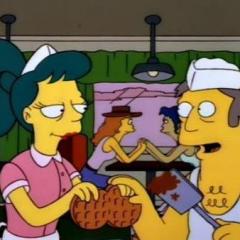
SPOILER TALK - The Last Jedi (open spoilers allowed!!!)
Taikomochi reacted to mstrox for a topic
An unsourced Redditor claims that Trevorrow wanted everything that upset Redditors wanted from the movie!1 point

